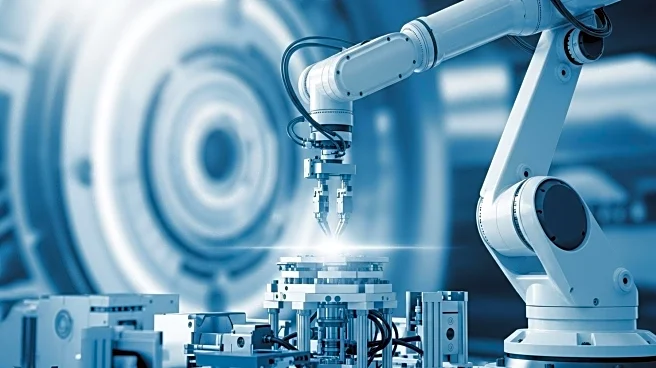What's Happening?
Justin Mayville, a Regional Sales Manager at Liebherr Gear & Automation Technologies, Inc., is actively involved in identifying opportunities for factory automation and providing solutions for North American manufacturers. With a background in military and industry education, Mayville's role focuses on enhancing profitability and productivity through advanced automation systems, including gantry systems, pallet handling systems, and robotics. His work involves traveling to various manufacturing operations to develop processes that align with Liebherr's product representation goals. Mayville's passion for manufacturing stems from the industry's role in societal advancement and evolution, contributing to making the world a better place.
Why It's Important?
The push for factory automation is crucial in the manufacturing sector as it aims to increase efficiency, reduce costs, and improve productivity. By integrating advanced technologies, companies like Liebherr Gear & Automation Technologies are setting a precedent for innovation in manufacturing processes. This transformation is significant for the U.S. manufacturing industry, which faces challenges such as labor shortages and global competition. Automation can help mitigate these issues by streamlining operations and enhancing output quality. As manufacturing evolves, companies that embrace automation are likely to gain a competitive edge, potentially leading to increased market share and economic growth.
What's Next?
Manufacturers are expected to continue investing in automation technologies to stay competitive. This trend may lead to increased collaboration between technology providers and manufacturing firms to develop customized solutions that address specific operational needs. Additionally, there may be a focus on training and education to equip the workforce with the necessary skills to operate and maintain automated systems. As the industry adapts to these changes, stakeholders, including policymakers and educational institutions, might play a role in supporting the transition through incentives and programs that promote technological adoption.
Beyond the Headlines
The shift towards automation in manufacturing raises ethical and cultural considerations, such as the impact on employment and the need for workforce retraining. As automation reduces the demand for manual labor, there may be societal implications regarding job displacement and economic inequality. Addressing these challenges requires a balanced approach that includes investment in education and skill development to prepare workers for new roles in an automated environment. Furthermore, the cultural perception of manufacturing as a career choice may evolve, with increased emphasis on technology and innovation attracting a new generation of workers.









